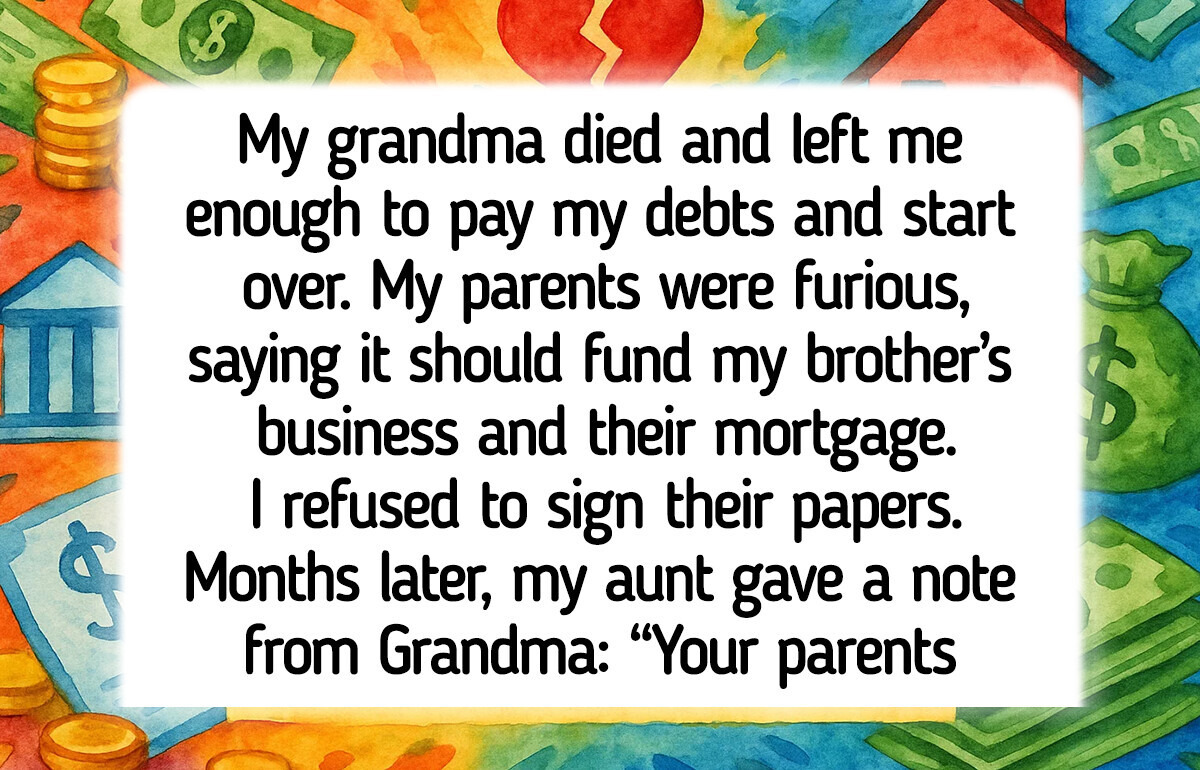No you abided by your Grandmother’s wishes, your parents received their inheritance early, don’t give it another thought. Wishing you the best.
I Cut Off My Parents After They Tried to Manipulate Me With My Inheritance — and the Truth Came Out

Her words show how quickly love and loyalty can get tangled up when money enters the picture: The letter.

Hi Bright Side!
When my grandma passed away, he left me a modest inheritance — not millions, but enough to finally pay off my debts and start saving for a place of my own. I was shocked; I didn’t even know I was in his will.
My parents, though, were furious. They said it wasn’t “fair” and should go into a “family fund” for my brother’s business and their mortgage. My mom said, “You only got that money because we took care of him. We deserve part of it too.”
When I refused, things spiraled. My dad called me selfish, my mom cried, and my brother told me I was “lucky I even had parents who cared.” Then came the family meeting — really more of an ambush — where my dad slid transfer papers across the table. I stood up, told them I wouldn’t sign, and walked out.
A few months later, my aunt called. She’d been helping settle the estate and found a file with my name on it — from Grandma. Her note started gently:
“I wanted you to have this because you’ve always worked hard quietly. I see more of myself in you than anyone.”
Then came the part that broke me:
“Your parents borrowed from me years ago and never paid it back. They promised to, but I stopped asking. This money was what they owed — I’m just giving it to the right person now.”
All those years, they’d acted like I didn’t contribute, but I’d unknowingly carried their debt.
Now they say I divided the family.
But honestly, I just uncovered the truth they were hoping I’d never find.
What did I do wrong?
How to Handle Parents Asking for Money — Without Losing Your Cool (or Your Savings)

When your parents start asking you for money, it can feel like the world just flipped. These are the people who once paid for your school trips, your braces, your rent “just this once.” Now they’re the ones reaching out — and suddenly, the line between love and obligation gets blurry.
You might feel proud to help, guilty if you can’t, or frustrated if it starts to feel one-sided. And guess what? Every one of those emotions is valid.
The real challenge isn’t just about money — it’s about balance. How do you support your parents without losing your own stability or peace of mind? Here’s how to find that middle ground.
💭 1. It’s Okay to Feel Torn
Helping your parents can feel like returning the love they once gave you — but what if you’re still trying to build your own future? As therapist Silvia Dutchevici explains, money isn’t just about numbers; it carries guilt, power, and old expectations. That’s why it feels so complicated — because it is.
💡 2. Think About the Ripple Effect
Before saying yes, ask yourself: Will this put me in debt? Is this a one-time crisis or the start of a pattern? If your parents have struggled with money before, constant financial help might only keep that cycle going. Love doesn’t mean funding bad habits — it means helping them find stability.
❤️ 3. Boundaries Keep Love Intact
Boundaries aren’t rejection — they’re protection, for both sides. Try gentle honesty:
“I can help with X amount this month, but not regularly.”
“I can’t give money, but I’ll help find other resources.”
You’re not saying no to them — you’re saying yes to a healthier relationship.
💰 4. Be Clear: Loan or Gift?
If you decide to give money, define it clearly. Is it a loan (with terms written down) or a gift you don’t expect back? Don’t risk your financial future on money you can’t afford to lose. Support is beautiful — as long as it doesn’t cost your stability.
🌿 5. Explore Other Ways to Help
Love doesn’t always have to come with a price tag. You can still show support without handing over cash — help your parents make a budget, pay one bill directly, or look into community or senior support programs together. Even simple gestures, like grocery shopping or cooking for them, can ease their stress without draining your savings. Sometimes, time and care are worth more than money.
Toxic Parents: Signs & How to Deal With Them

You OWE THEM NOTHING. They on the otherhand still owed your grandparent. Tell them that you plan on collecting that debt or they can STFU! As far as A FAMILY FUND goes, tell them AGAIN that since they never paid back what THEY BORROWED, until and unless they do, they are not entitled to anything, and even then they aren't going to get any money from you. Honor your grandparent and ignore the grifters that call themselves your family.
💭 What Is a Toxic Parent?
A toxic parent is someone whose words or actions slowly erode a child’s confidence, boundaries, or sense of safety. They can be controlling, manipulative, overly critical, or even emotionally abusive. And the hardest part? It’s not always loud or obvious. Sometimes, it’s the guilt trips, backhanded comments, or silent treatment that leave the deepest scars.
⚡ Common Types of Toxic Parents
Dismissive: Ignore your feelings and make you feel invisible.
Helicopter: Control every move, leaving no room for independence.
Narcissistic: Put their own needs and image above everyone else’s.
Permissive: Avoid boundaries altogether, creating confusion and chaos.
🚩 Signs You May Have Toxic Parents
Constant criticism or verbal put-downs.
Emotional manipulation or guilt-tripping.
Over-controlling behavior and unrealistic expectations.
Prioritizing their needs over yours.
Ignoring your boundaries or privacy.
💔 How It Affects You
Growing up with toxic parents doesn’t just end when you move out. It can leave lasting marks — anxiety, low self-esteem, depression, even physical stress symptoms. Many adults raised this way struggle with trust, boundaries, or feeling “enough” in future relationships.
🌱 How to Protect Yourself
Set firm boundaries — and stick to them. Boundaries aren’t cruelty; they’re self-respect.
Validate your feelings. You’re not “too sensitive.” You’re reacting to pain that’s real.
Don’t try to fix them. Focus on protecting your peace, not changing their behavior.
Share less. You can love someone and still keep your private life private.
Find your people. Lean on friends, therapists, or support groups that remind you what healthy love feels like.
Practice self-care. Do things that rebuild your confidence and soothe your nervous system.
Detach with compassion. It’s okay to love them — and still step away to heal.
You can love your parents deeply without bankrupting yourself. Saying “no” doesn’t mean you don’t care — it just means you’re protecting both your future and your relationship with them.
11 People Who Show That Kindness Is What Really Makes Us Strong
Comments
Why in the world with your parents think your inheritance should fund your brother's business? Like if they think that money should be used for one of their children to be able to start their own business why wouldn't you use it to start your own? It's your money and you're just as much their child.
Granny left that $ to OP for a reason. She should keep it. If her parents & bro keep bugging her for it she should go NC til they stop
Related Reads
15 Moments That Show Quiet Kindness Is the Strength the World Needs Most

15 Stories That Prove the Universe Has a Beautiful Way of Rewarding Good Hearts

My Crazy MIL Expects Me to Host Christmas Alone—This Year I’m Done

I Refused to Quit My Career After They Hired a Gen Z to Replace Me

A Stranger Humiliated My Daughter at Disney World—He Picked the Wrong Mom to Mess With

15 Times Someone Showed Kindness Without Saying Anything

11 People Who Chose Humanity Over Hatred in the Darkest Moments

12 Strangers Who Restored Our Faith in Humanity in Under a Minute

I Refused to Share My Inheritance With a Family That Didn’t Accept Me

14 Dates That Started Like Movies but Ended Like Sitcoms

12 Grandparents Who Prove They’re the Heart of a Family

I Refuse to Return My Late Colleague’s Paycheck, Now His Widow Is Furious
